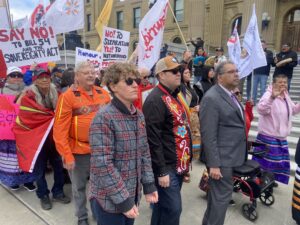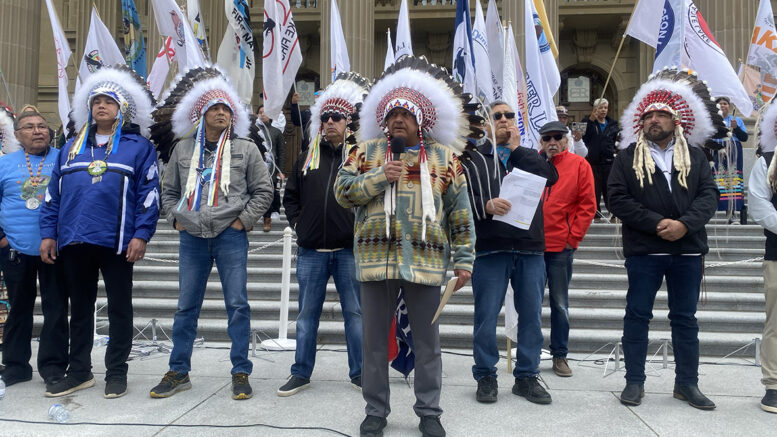By Jeremy Appel, Local Journalism Initiative Reporter
(ANNews) – Hundreds of people attended a rally that First Nations leaders from across Alberta organized at the Legislature in Edmonton to protest the premier’s ongoing separatist threats, which every speaker agreed would run roughshod over Treaty rights.
The May 15 event opened with drumming and a grand entry while Elders burned sacred herbs for smudging, followed by remarks from leaders representing Treaty 6, 7 and 8.
The protest was a way for Treaty First Nations in Alberta to present a united front in the face of Bill 54, which lowers the threshold for bringing forward a referendum.
Premier Danielle Smith has said that she will hold a referendum on independence in 2026 if a petition in support of one gets enough signatures.
 “Let us stand loud and clear and concise that no provincial government can hold a referendum to overturn our treaty,” Confederacy of Treaty 6 First Nations Grand Chief Greg Desjarlais told attendees. “We do not answer to the provincial government.”
“Let us stand loud and clear and concise that no provincial government can hold a referendum to overturn our treaty,” Confederacy of Treaty 6 First Nations Grand Chief Greg Desjarlais told attendees. “We do not answer to the provincial government.”
Desjarlais, who is also the elected chief of Frog Lake First Nation, said he “took many arrows and many bullets, many from my own people” for meeting with Premier Smith about Bill 54, which he said was part of the confederacy’s “diplomatic” and “patient” approach to the separatist threat.
The meeting resulted in Justice Minister Mickey Amery amending the bill to say that no separation referendum question can threaten First Nations Treaty rights, which First Nations leaders dismissed as meaningless.
“Let me be clear, this push for Alberta separation is not just dangerous, it’s a violation of Treaty, natural law and the land itself,” said Desjarlais.
Treaties 6, 7 and 8 were signed in 1876, 1877 and 1899, respectively, all before Alberta was established as a province in 1905.
Treaty 8 Grand Chief Trevor Mercredi commented that the day’s display of unity “is what we’ve needed for a long time.”
“When our nations and our Treaty are threatened, we need to come together,” he added.
“There’s no separation between the chiefs and the councils and our people. We are all Treaty people when it comes to our Treaty. Each and every meeting that we are attending is to protect our children.”
Grand Chief Mercredi emphasized that this includes non-Indigenous people as well. “If you’re in Alberta, in Canada, you are recognized as [part of the] Treaty,” he said.
Representing Treaty 7 was Tsuut’ina Minor Chief Regena Crowchild, who spoke on behalf of Chief Roy Whitney.
“Any attempt to undermine or infringe on our Treaty rights will be met with unwavering resistance,” said Crowchild, who emphasized that she hasn’t had any discussion “whatsoever” with the premier on Bill 54.
“Defending our Treaty rights has always been a priority for me, and there are numerous examples of Tsuut’ina taking a strong stand against both federal and provincial actions that threaten those rights.”
Saddle Lake Cree Nation Chief Jason Whiskeyjack said it’s important to take the message “that we are stronger together” to the Legislature.
“We have to celebrate who we are as a people, and when we do that the people are going to hear, not only here in this building but every Albertan in this Treaty 6, 7 and 8 territory. They need to be reminded that this is Treaty land. Everywhere they go is Treaty land,” he said.
“There’s a lot of people wanting to separate. That’s fine. They could just leave.”
Chief Wilfred Hooka-Nooza of Dene Tha’ First Nation in Treaty 8 said that attendees were gathered “not as protesters, but as guardians of a promise older than the province of Alberta itself.”
“Our Treaties are not relics. They are not documents to be shelved and forgotten,” Chief Hooka-Nooza added. “They are living, breathing commitments. They are a promise of coexistence, mutual respect and shared responsibility to this land we call home.”
In addition to band leaders, Indigenous NDP MLAs Brooks Arcand-Paul of Alexander First Nation and Jodi Calahoo Stonehouse of Michel First Nation were at the event, as was independent MLA Scott Sinclair, who is non-status First Nation.
Also in attendance were Alberta NDP Leader Naheed Nenshi and several other NDP MLAs, Edmonton Mayor Amarjeet Sohi, and former deputy premier Thomas Lukaszuk, as well as Alberta Federation of Labour president Gil McGowan and secretary treasurer Cori Longo.



Daniel Smith is wrong ! This is treaty land! We are Albertans ! We are stronger together. This is part of Canada. If she doesn’t want to be a Canadian she can leave!
Legal Challenge:
Indigenous groups can file a legal challenge against the bill on the grounds that it violates their rights under treaties 6, 7, and 8, as well as the constitutional protection of Indigenous rights under Section 35 of the Constitution Act, 1982. They may argue that the government failed to fulfill its duty to consult.
Seek an Injunction:
While the legal challenge is ongoing, Indigenous groups can seek an injunction to prevent the bill from being enacted until the matter is resolved in court. This would require demonstrating that there is a serious issue to be tried and that there would be irreparable harm if the bill were allowed to proceed.
Engage in Political Advocacy:
Indigenous leadership can engage in political advocacy to rally public support against the bill. This can include lobbying provincial lawmakers, engaging with the media, and mobilizing community members to raise awareness about the implications of the bill.
Timing : It’s crucial to act promptly after the bill is passed. Delays in seeking an injunction can affect the court’s decision, as courts may be less inclined to grant an injunction if they believe the applicants waited too long to raise their concerns.